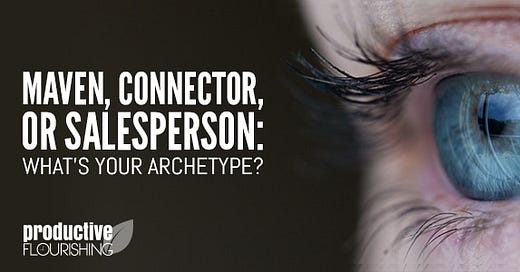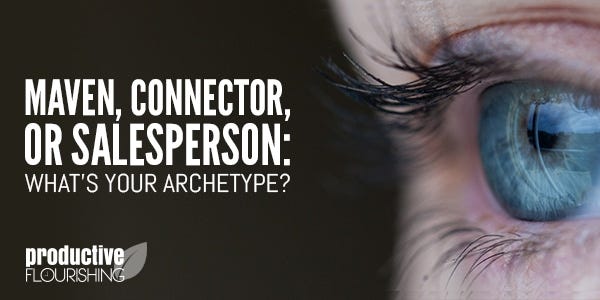Maven, Connector, or Salesperson: What's Your Archetype?
And knowing your secondary archetype is even more useful, too
In the book The Tipping Point, author Malcolm Gladwell talks about three different archetypes of people: mavens, connectors, and salespeople. If you're a changemaker, this framework can help you see why you work the way you do.
Pam Slim and I have been using this model for a few years, both in our Lift Off Retreat and with clients in our individual coaching practices. She also wrote a post on maven, connectors, and salespeople back in 2010 and has been nudging me to write this one since around that time. So, here we go.
Mavens Make Change Happen Through Information and Ideas
These are the people you ask whenever you want to know something about anything — they're always the people in the know. They're builders, engineers, process folks, and system folks. It's all about the ideas and the information.
You might be a maven if:
You often feel overwhelmed because you have so many big ideas to unpack.
You're often frustrated by how "thin" a lot of information seems.
You can get lost for days working on one idea, or spend months happily exploring the depths of one idea.
Your expression is largely about ideas and information, rather than about people or sizzle.
Connectors Make Change Happen Through People
They galvanize people. They're natural hubs. That's just the way they're oriented to the world. These are people who, every time you ask a question, start flipping a Rolodex in the back of their mind, saying, “Who do I know who knows this? Who do I know who has done this? Who do I know that I need to connect you with?” They love connecting you with people because they're all about the people.
You might be a connector if:
You are constantly referring people to the right expert or service to solve their problem.
You love networking and talking with people, just for the sake of doing it.
When you're talking to people, they say, "Wow — you know everyone!"
The stories you tell always focus on the people, not the ideas or the sizzle.
Salespeople Make Change Happen Through Persuasion
They can take an idea, make it sticky and accessible, and position it to get a tribe behind it. Salespeople are your storytellers and masters of persuasion. These are the people who can borrow your watch and then sell it back to you. They just have this uncanny ability to get you to buy into whatever they're selling, whether it’s an idea, a plan, or a product — it doesn't matter.
You might be a salesperson/persuader if:
When you talk about your next project, people are instantly hooked.
You sell things without meaning to. (Services, products, ideas — it doesn't matter what.)
You love the chase of getting someone to agree with you or buy into whatever you're selling.
It's really easy for you to get hooked on sticky, sizzle-y ideas, products, and services.
Your stories have sizzle at their basis, and the information and people support the compelling idea.
The thing about salespeople, or that title, is that people have a lot of Stuck around sales. There are a lot of salespeople out there who are really persuasive - i.e. they can always get people on their team and tell wonderful stories- but don't resonate with the sales title. So sometimes you'll hear me talk about "persuaders" rather than "salespeople" so that we open up that category, so people are open to considering, “What am I naturally good at?” and can start playing from that.
Why Knowing Your Archetype Matters
The goal in business and life is to really play to your strengths.
It’s about being YOU to the fullest and playing with the deck of cards that you have. After using this model for a few years, I started distinguishing between people's primary archetype and their secondary archetype. I noticed that a lot of people said, "Well, I’m kind of a maven but I'm also kind of a salesperson.” This is why I talk about the concept a little bit differently than both Pam and Malcolm Gladwell.
Yes, I am (primarily) a maven, so I would start pulling out subtle differences, but it's more than just wordplay. Knowing what your primary and secondary archetypes are is important because your primary tells you why you do something and what you're going to be naturally motivated to do, whereas the secondary tells you how it's going to make the most sense for you to do it.
This means we actually have six categories. Here is a quick breakdown of what they look like, with an example to help you see what these archetype combinations can look like.
Maven-Connector: "I'm all about this big idea, but I'm doing it to galvanize and make things happen with people." Example: Charlie Gilkey
Maven-Salesperson: "I'm all about this big idea, and I'm going to make sure everyone knows and can access it." Example: Seth Godin
Connector-Maven: "People and relationships are important, and I can make them even better with my ideas." Example: Pam Slim
Connector-Saleperson: "People and relationships are important, and we can all be better if we band together behind something." Example: Terry "Starbucker" St. Marie
Salesperson-Maven: "This is what we're going to do, and here is my idea about why and how we're going to make it happen." Example: Danielle LaPorte
Salesperson-Connector: "This is what I'm going to do, and you should join me." Example: Chris Guillebeau
A few model notes. First, the simplistic statement is not meant to encapsulate the entirety of or nuances of these people's great work. Second, I've noticed that it's easy for people to get confused when their great work is with people, ideas, or persuasion; i.e., mavens who focus on marketing and sales may assume that they're salespeople, when in fact they're excited about the ideas and processes around marketing.
What's really fascinating about this is the way in which these personality types interact with each other. Remember, you're not in a vacuum — you're always a part of a broader community, a broader ecology. And this is where things get really exciting and this is where the magic happens!
If you're a maven, you know you need to ally yourself with connectors, because they're going to connect you with the people world, and you need to ally yourself with salespeople, because they can take whatever it is that you do, hone it, and make it more approachable. We mavens are inherently challenged with making our ideas sticky, making them easy to understand and grab onto. We like to talk about frameworks, processes, and systems, which we're fascinated by. If we talk to other mavens about this, we’ll have two-and-half-hour long conversations that we enjoy but drive everyone else crazy.
It’s the same with connectors. If you're a connector, you need to ally yourself with mavens and salespeople. The mavens will take what you're doing and add depth, rigor, and substance to it. So, if you're launching a product, it’s great to have mavens on your side, because they'll give suggestions like, “Maybe you should structure it this way,” or “Maybe this will be the best way to get users.” Salespeople are able to help you use your natural gift of connecting with people in a way that makes your message or what you're doing easy to spread.
Likewise, if you're a salesperson, ally yourself with a maven for the rigor and depth your idea needs to have lasting power. Then, ally yourself with connectors, so you can really learn how to make change happen through people. (That's really what this is about, after all.)
Play to Your Strengths
I want to keep this fairly brief to get the idea out there and to introduce this idea: When you play with your natural strengths and genius zone, you're going to have far better results. If you're naturally a salesperson, don't try to be a maven — you can't do it! If you're naturally a connector, don't try to be a salesperson — you can't do it! You can learn how to mimic it, you can learn the skills of that domain, but you can't truly be that person.
A simpler way to say all of this is: be you and be you all the way. That's what I would've said if I were a salesperson. :)





